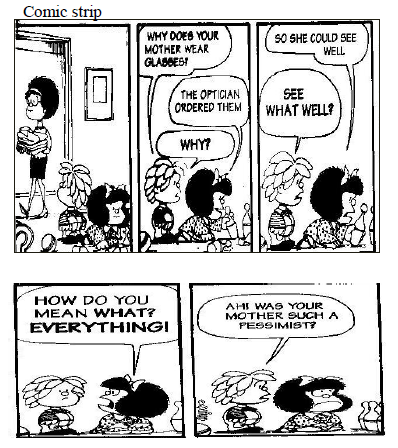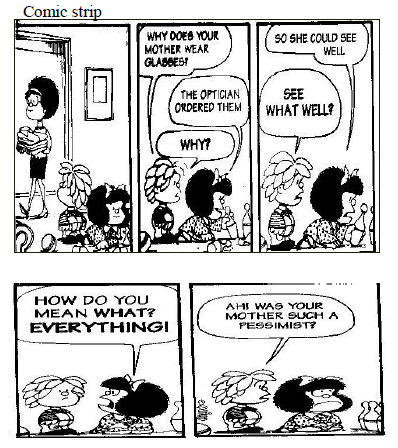Questões de Concurso
Comentadas para itame
Foram encontradas 1.830 questões
Resolva questões gratuitamente!
Junte-se a mais de 4 milhões de concurseiros!
I. Educação especial II. Educação Profissional e Tecnológica III. Educação a distância IV. Educação popular
I. Uma educação ética visa proporcionar aos educandos condições que levem ao desenvolvimento de sua autonomia intelectual. II. Na relação professor-aluno é importante considerar que o ato pedagógico possui três dimensões complementares entre si – axiológica, epistemológica e ética. III. Do ponto de vista da educação ética, a relação professor-aluno deve estar sintonizada com a visão de mundo do professor, que determina o saber. IV. A ação pedagógica é politicamente determinada, por isso, cabe ao professor fazer uma opção para orientar o seu trabalho.
Estão corretas:
I. As teorias críticas enfatizam aspectos como a ideologia, a reprodução cultural e social, as relações de poder. II. As teorias pós-críticas denunciam o multiculturalismo presente no currículo. III. As teorias tradicionais enfatizam o ensino, a aprendizagem, a avaliação, os procedimentos metodológicos, o planejamento etc. IV. As teorias tradicionais consideram-se neutras e desinteressadas. V. As teorias críticas argumentam que toda teoria implica relações de poder.
I. O pensamento curricular pós-estruturalista fundamenta-se na teoria foucaultiana e pressupõe uma formação, entre outros aspectos que considera as demandas imediatas dos indivíduos, das suas culturas e das suas relações de poder adstritas às estruturas de governamentabilidade. II. O pós-estruturalismo constitui-se em uma perspectiva que toma como referência psicológica as metanarrativas da escola de Vigotski e defende intransigentemente o fundamento ontológico e gnosiológico da atividade vital consciente da realidade objetiva como condição inexorável para o salto do ser natural para o ser social. III. A teoria curricular histórico-crítica fundamenta-se na pedagogia liberal e vincula-se às pedagogias aglutinadas em torno do lema “aprender a aprender” que também podem ser nominadas e pedagogias pós-modernas e são conhecidas como: pedagogia construtivista, pedagogia multiculturalista, pedagogia dos projetos, teoria do professor reflexivo e pedagogia das competências. IV. A teoria curricular histórico-crítica forma-se a partir dos trabalhos do teórico brasileiro Dermeval Saviani e toma como referência a filosofia dialética materialista e histórica, que defende o conhecimento como método de apropriação de realidade num caminho que vai da síncrese à síntese, pela mediação da análise e, por sua vez, propicia a genericidade humana em um processo de elevação que ocorre da anomia à autonomia, pela mediação da hetoronomia.
Marque a alternativa correta:

the sentence that best shows how the second comic strip would be correctly reported is:

It can be inferred from the text reading that

the modal verb could can be replaced,
observing the precedent sentences and without any
changing in meaning, by to
Chile Violence Continues Despite Government's Retreat on Fare Hike
By Eva Vergara
(SANTIAGO, Chile) — Protests and violence in Chile spilled over into a new day and raged into Sunday night despite the president cancelling a subway fare hike that has prompted violent demonstrations.
Officials in the Santiago region said three people died in fires at two looted supermarkets early Sunday — among 60 Walmart-owned outlets that have been vandalized, and the company said many stores did not open during the day. Five more people later were found dead in the basement of a burned warehouse and were not employees, authorities said.
At least two airlines cancelled or rescheduled flights into the capital, affecting more than 1,400 passengers Sunday and Monday.
President Sebastián Piñera, facing the worst crisis of his second term as head of the South American country, announced Saturday night that he was cancelling a subway fare hike imposed two weeks ago. The fare boost touched off major protests that included rioting that caused millions of dollars in damage to burned buses and vandalized subway stops, office buildings and stores.
After meeting with the heads of the legislature and judicial system Sunday, Piñera said they discussed solutions to the current crisis and that he aims “to reduce excessive inequalities, inequities abuses, that persist in our society.”
Jaime Quintana, president of the Senate, said that “the political world must take responsibility for how we have come to this situation.”
Authorities said 10,500 soldiers and police officers were patrolling the streets in Santiago as state of emergency and curfew remained in effect for six Chilean cities, but protests continued during the day. Security forces used tear gas and jets of water to try disperse crowds.
Interior Minister Andrés Chadwick reported that 62 police officers and 11 civilians were injured in the latest disturbances and prosecutors said nearly 1,500 people had been arrested. He said late Sunday that there had been more than 70 “serious events” during the day, including more than 40 incidents of looting.
With transportation frozen, Cynthia Cordero said she had walked 20 blocks to reach a pharmacy to buy diapers, only to find it had been burned.
“They don’t have the right to do this,” she said, adding it was right to protest “against the abuses, the increases in fares, against bad education and an undignified pension, but not to destroy.”
Long lines formed at gas stations as people tried to fill up for a coming workweek with a public transport system disrupted by the destructive protests. Santiago’s subway, which carries an average of 2.4 million riders on a weekday, had been shut down since Friday.
Subway system chief Louis De Grange said
workers would try to have at least one line running
Monday, but he said it could take weeks or months
to have the four others back in service. He said 85
stations and more than three-fourths of the system
had been severely damaged.
Chile Violence Continues Despite Government's Retreat on Fare Hike
By Eva Vergara
(SANTIAGO, Chile) — Protests and violence in Chile spilled over into a new day and raged into Sunday night despite the president cancelling a subway fare hike that has prompted violent demonstrations.
Officials in the Santiago region said three people died in fires at two looted supermarkets early Sunday — among 60 Walmart-owned outlets that have been vandalized, and the company said many stores did not open during the day. Five more people later were found dead in the basement of a burned warehouse and were not employees, authorities said.
At least two airlines cancelled or rescheduled flights into the capital, affecting more than 1,400 passengers Sunday and Monday.
President Sebastián Piñera, facing the worst crisis of his second term as head of the South American country, announced Saturday night that he was cancelling a subway fare hike imposed two weeks ago. The fare boost touched off major protests that included rioting that caused millions of dollars in damage to burned buses and vandalized subway stops, office buildings and stores.
After meeting with the heads of the legislature and judicial system Sunday, Piñera said they discussed solutions to the current crisis and that he aims “to reduce excessive inequalities, inequities abuses, that persist in our society.”
Jaime Quintana, president of the Senate, said that “the political world must take responsibility for how we have come to this situation.”
Authorities said 10,500 soldiers and police officers were patrolling the streets in Santiago as state of emergency and curfew remained in effect for six Chilean cities, but protests continued during the day. Security forces used tear gas and jets of water to try disperse crowds.
Interior Minister Andrés Chadwick reported that 62 police officers and 11 civilians were injured in the latest disturbances and prosecutors said nearly 1,500 people had been arrested. He said late Sunday that there had been more than 70 “serious events” during the day, including more than 40 incidents of looting.
With transportation frozen, Cynthia Cordero said she had walked 20 blocks to reach a pharmacy to buy diapers, only to find it had been burned.
“They don’t have the right to do this,” she said, adding it was right to protest “against the abuses, the increases in fares, against bad education and an undignified pension, but not to destroy.”
Long lines formed at gas stations as people tried to fill up for a coming workweek with a public transport system disrupted by the destructive protests. Santiago’s subway, which carries an average of 2.4 million riders on a weekday, had been shut down since Friday.
Subway system chief Louis De Grange said
workers would try to have at least one line running
Monday, but he said it could take weeks or months
to have the four others back in service. He said 85
stations and more than three-fourths of the system
had been severely damaged.
Chile Violence Continues Despite Government's Retreat on Fare Hike
By Eva Vergara
(SANTIAGO, Chile) — Protests and violence in Chile spilled over into a new day and raged into Sunday night despite the president cancelling a subway fare hike that has prompted violent demonstrations.
Officials in the Santiago region said three people died in fires at two looted supermarkets early Sunday — among 60 Walmart-owned outlets that have been vandalized, and the company said many stores did not open during the day. Five more people later were found dead in the basement of a burned warehouse and were not employees, authorities said.
At least two airlines cancelled or rescheduled flights into the capital, affecting more than 1,400 passengers Sunday and Monday.
President Sebastián Piñera, facing the worst crisis of his second term as head of the South American country, announced Saturday night that he was cancelling a subway fare hike imposed two weeks ago. The fare boost touched off major protests that included rioting that caused millions of dollars in damage to burned buses and vandalized subway stops, office buildings and stores.
After meeting with the heads of the legislature and judicial system Sunday, Piñera said they discussed solutions to the current crisis and that he aims “to reduce excessive inequalities, inequities abuses, that persist in our society.”
Jaime Quintana, president of the Senate, said that “the political world must take responsibility for how we have come to this situation.”
Authorities said 10,500 soldiers and police officers were patrolling the streets in Santiago as state of emergency and curfew remained in effect for six Chilean cities, but protests continued during the day. Security forces used tear gas and jets of water to try disperse crowds.
Interior Minister Andrés Chadwick reported that 62 police officers and 11 civilians were injured in the latest disturbances and prosecutors said nearly 1,500 people had been arrested. He said late Sunday that there had been more than 70 “serious events” during the day, including more than 40 incidents of looting.
With transportation frozen, Cynthia Cordero said she had walked 20 blocks to reach a pharmacy to buy diapers, only to find it had been burned.
“They don’t have the right to do this,” she said, adding it was right to protest “against the abuses, the increases in fares, against bad education and an undignified pension, but not to destroy.”
Long lines formed at gas stations as people tried to fill up for a coming workweek with a public transport system disrupted by the destructive protests. Santiago’s subway, which carries an average of 2.4 million riders on a weekday, had been shut down since Friday.
Subway system chief Louis De Grange said
workers would try to have at least one line running
Monday, but he said it could take weeks or months
to have the four others back in service. He said 85
stations and more than three-fourths of the system
had been severely damaged.